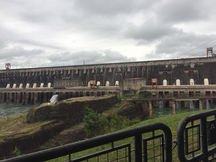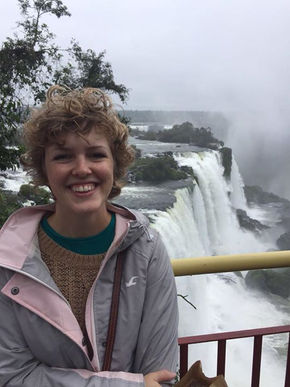
Before
Thoughts about Brazil and Interning Abroad
To start the trip, I didn't know much about the country of Brazil to include the geography or it's associated society and culture. What I thought I knew, was that high quality swimwear often hailed from this country, that the climate was fully tropical from the highest point on the map, to the most southern areas of the country. I also believed that the famous rivers were something accessible at any location in Brazil (easily disproved with a close look at any map, but a preconceived notion nonetheless!).
I had heard of Brazilian's love for coffee, but imagined it to be similar to coffee we have in the United States: a big tall cup of hot steaming Joe with a good dollop of sugar and cream. How different could coffee really be?
I'd heard rumors of Brazilian passion for what we in the United States know as soccer (but what is referred to in Brazil as 'futbol' and imagined the fervor to be similar to that of North American football!
I had also never once even given thought, as a Floridian traveling internationally, to the fact that when crossing hemispheres, it is logical that the season currently causing heatstroke's in the northern half, would be experiencing it's direct opposite in the southern half. This would entail leaving the shorts and flip-flops of Florida's summer heat, for layers of warm clothes to immediately enter winter in Brazil.
During my stay in Brazil I found many of my preconceived ideas of what Brazil would be like, to be entirely inaccurate! I found myself consistently learning new things I never knew, I never knew; both in social and personal aspects and in professional aspects.
It is a known fact that: 'Science is in English'. To be published in scientific articles, you must write in English, scientific protocols are written in English, to present a PhD dissertation you must first know English and so on. For some reason I thought this just meant, as an aspiring scientist in Brazil, I would encounter absolutely no difficulties whatsoever having to do with my less than inspiring knowledge of the language (Brazilian Portuguese). However, I found that this was simply not true.
When traveling internationally anywhere, its probably best to have at least a conversational level of knowledge of the language, because it turns out not EVERYONE in Brazil is a scientist! You would still have to tell your Uber driver where you wanted to be taken.
Knowing the simple phrase:
'Good afternoon, my name is Rorie. I am from the United States, and I am a student. How are you?'
(Bom dia! Meu nome é Rorie. Eu sou dos Estados Unidos e sou um estudante. Como você está?)
while fully accurate... won't get you very far!
The coffee I'd thought couldn't be so different, couldn't have been more different! Not only was it 1/10th the size of an American coffee from your local Dunkin' it was also somehow 10X the strength of the large American coffee. These little delights of pure caffeine were known as café zinhos or small coffee.
The Brazilian's refer to our American large coffees as 'large brown waters'.
There was never any cream to be had at any coffee station in any room of any building.
Which is another thing I never expected, and never knew I needed:
There was a COFFEE STATION in EVERY ROOM.
Entering a restaurant? Free coffee.
Waiting on incubation in the lab? There's a break room attached with a coffee station.
In the airport, in the labs, in restaurants, in museums, in shops. Coffee everywhere! A land for coffee lovers! I'd found myself in an unknown coffee-lover's paradise, with a strangely high tolerance for caffeine upon my arrival back to Florida.
Scroll over the photos to discover more about what is happening in each photo!


After The International Internship Adventure:
A lesson in humanity
After interning abroad in Brazil I came home with extremely different methods of approaching the world and understanding how life internationally not only exists, but is vastly different and even similar to my own. I found people who sometimes didn't speak the same language as me as was the case of the college student whose home I shared, but went every extra effort to make sure I felt at home and learned that spoken language is not the only way to communicate with people who don't share a similar tongue.
I found scientists who spoke passionately about topics that influenced their culture, as well as finding how governments and countries of origin impacted scientific disciplines.
I found directors of science centers who made it a point to celebrate the cleaning workers birthdays, share cafezinhos (small delicious Brazilian coffees) and fresh-baked bread with everyone within the IBTEC center to start off the day and receptionists who went out of their way to make sure everyone had lunch for the day even if she had to put in the orders for everyone and go and retrieve it.
I found fellow students, who although at the Masters, PhD, and Post Doc levels above my own Bachelor of Applied Science, would take days off from doing their own research projects to make sure I could follow their research and why each step was necessary and then allow me to participate actively in their research so that I could have the experience of working with real research.
I found students who were so uncertain of their abilities to speak English well enough to be understood by the American students that when asked if they spoke English, merely shook their heads as if they did not understand. This same student was to come to my aid later with astoundingly well-spoken English when I encountered an elderly scientist at the Brazilian national seed bank who truly spoke no English, but wanted to tell us in full detail of all of his gained knowledge through his years and his passion for the work.
I found a culture who so coincided with my own values that I felt as though I had found a new family within the small scientific community of Botucatu, Brazil. We exchanged Christmas ornaments that I will treasure for years to come, as well as dining experiences, laughs, and an unmatchable learning experience that will drive my love for science and international experiences for the rest of my life.























